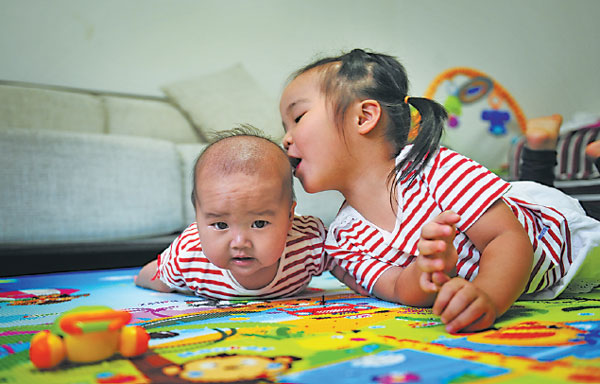

 |
| A girl and her brother play together at their home in Fuzhou, Fujian province. The little boy was born after changes to China's family planning policy last year that allowed couples to have two children if one partner is an only child. Provided from China Daily |
China is to allow all couples to have two children. This well-received policy amendment has become a heated discussion nationwide.
Many westerners are no strangers to China’s one-child policy. Ever since its becoming of the basic national policy in the 1980s, one-child policy has been seeing skepticism and oppositions for "human rights violation". Yet, the issue of population is a much more complicated problem than westerners could imagine, especially for a country taking up a quarter of the world’s population. The one-child policy was a tough decision made amidst dilemma. Now that it’s over 30 years after its implementation, the fact is that this policy did effectively suppress China’s rapid population growth.
Lifting the one-child policy is an innovative continuation and reform from the previous population planning. China is facing issues of aging population and decreasing birth rates. The new adjustment is a wise move; it is an adaptive reform.
The real question behind this policy is – what now? To both the central and local governments in China, issues such as whether people want to have baby remain to be solved. Furthermore, the rising cost of raising children, the weighty pressure of caring elderlies, and the rapid economic growth – all these issues have changed people's mindset on having children. Rather than relying on the new policy to take effect by itself, the government, regardless central or local, should step in by providing more supportive measures, such as subsidizing child and elderly care, and introduce more incentives for family to have children. All these will certainly help to achieve the desired effect of the policy.
The change of population will affect the whole society. Not only does the lifting of one-child policy change a family structure, it also alters social structure as well as people’s mindset. Will there be more discrimination against women in employment? Will there be enough education resources for all? Will there be more demand for public services? In the process of lifting the one-child policy, it is essential that the Chinese government, while concerning the population issue, to have a systematic assessment and measures to react to any possible impact that this policy may bring to the society.
Ancient Chinese philosopher Sun Bin once said in his Art of War that "Nothing is more valuable in the universe than human beings." People determine the destiny of a country. The single-child generation in China is to become the past. China is moving into an era of two-children.
(Translated from abridged 《放開二孩,聽清輿論真問題》 published on People's Daily, November 2, 2015)
 When a Chinese woman marries an Indian man
When a Chinese woman marries an Indian man Love beyond limit of heights in the world
Love beyond limit of heights in the world
 Photos of beautiful teacher hit the Internet
Photos of beautiful teacher hit the Internet Transparent Over-cliff Path Cracked Suddenly
Transparent Over-cliff Path Cracked Suddenly Bride-to-be tries to save drowned man
Bride-to-be tries to save drowned man Russian helicopter lands safely after being attacked in Syria
Russian helicopter lands safely after being attacked in Syria Models change clothes on street in Hangzhou
Models change clothes on street in Hangzhou Winding mountain road
in China
Winding mountain road
in China In pics: army beauties across world
In pics: army beauties across world Top 20 hottest women in the world in 2014
Top 20 hottest women in the world in 2014 Top 10 hardest languages to learn
Top 10 hardest languages to learn 10 Chinese female stars with most beautiful faces
10 Chinese female stars with most beautiful faces China’s Top 10 Unique Bridges, Highways and Roads
China’s Top 10 Unique Bridges, Highways and Roads Mind your meat
Mind your meat Used and abused
Used and abused Lifting one-child policy echoes people’s will
Lifting one-child policy echoes people’s will Muscle beach Beat ‘em to the punch at China’s seaside bodyguard school
Muscle beach Beat ‘em to the punch at China’s seaside bodyguard schoolDay|Week